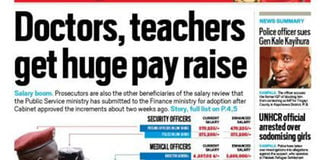Selective handouts killing civil service

What you need to know:
The issue: Pay rise.
Our view: The government should take deliberate efforts to review and rationalise the pay structure.
Many public sector workers are angry. They have vilified government’s selective pay rise as a shrewd attempt to win the support of some public sector workers without addressing the real concerns of an increasingly disgruntled civil service.
In view of a pitiful pay rise, some officials in ministries, departments and agencies are now supervising subordinates with a higher pay cheque. This has messed up the public service pay structure, killed morale and in the process rooted the pay gulf that has created unnecessary hostility in public service.
Some civil servants benefited from the pay rise not because they are the most deserving, but because they made noise, threatened to strike or met the President. But even in the most egregious cases, fragmentary approaches to matters of State cannot solve anything. These government interventions are a kin to painkillers.
As a country, we must get serious and prescribe a permanent solution to salary disparities in civil service. Let’s put in place a minimum wage in Uganda and at the same time amend the Constitution and establish a salaries review commission. Civil society watchdogs, together with other independent-minded stakeholders made similar cries before, but the Executive and Parliament have decided to disregard these cries.
In fact, if our MPs were MPs in real sense, the 2019/20 Budget with selective pay rise wouldn’t have sailed through Parliament. The MPs should have made a case for a comprehensive salary increment for civil servants. The scientists, teachers, medical workers, judicial officers and other categories shop from the same market.
The well-paid MPs exhibited impunity and discounted voices of reason and forgot that the people’s well-being is rooted in the social contract with the voters. They ignored the mess in public service and increased their allowances by 39 per cent and that of parliamentary staff by 15 per cent, citing increasing cost of living. Luckily, the Supreme Court has since upheld the 2016 ruling of the Constitutional Court that impugned Section 5 of the Parliament (Remuneration of Members) Act, 1981. This Section, together with Article 85 of the Constitution (as amended) had turned Parliament into a bottomless pit.
The call for an equitable salary structure is not new. In May 2017, a study report by the Equal Opportunities Commission on salary disparities in the public service made a case for equal access to opportunities across all aspects of life, a major prerequisite for inclusive growth, socio-economic transformation and sustainable improvement of both human welfare and the environment.
The government should, therefore, take deliberate efforts to review and rationalise the pay structure.




